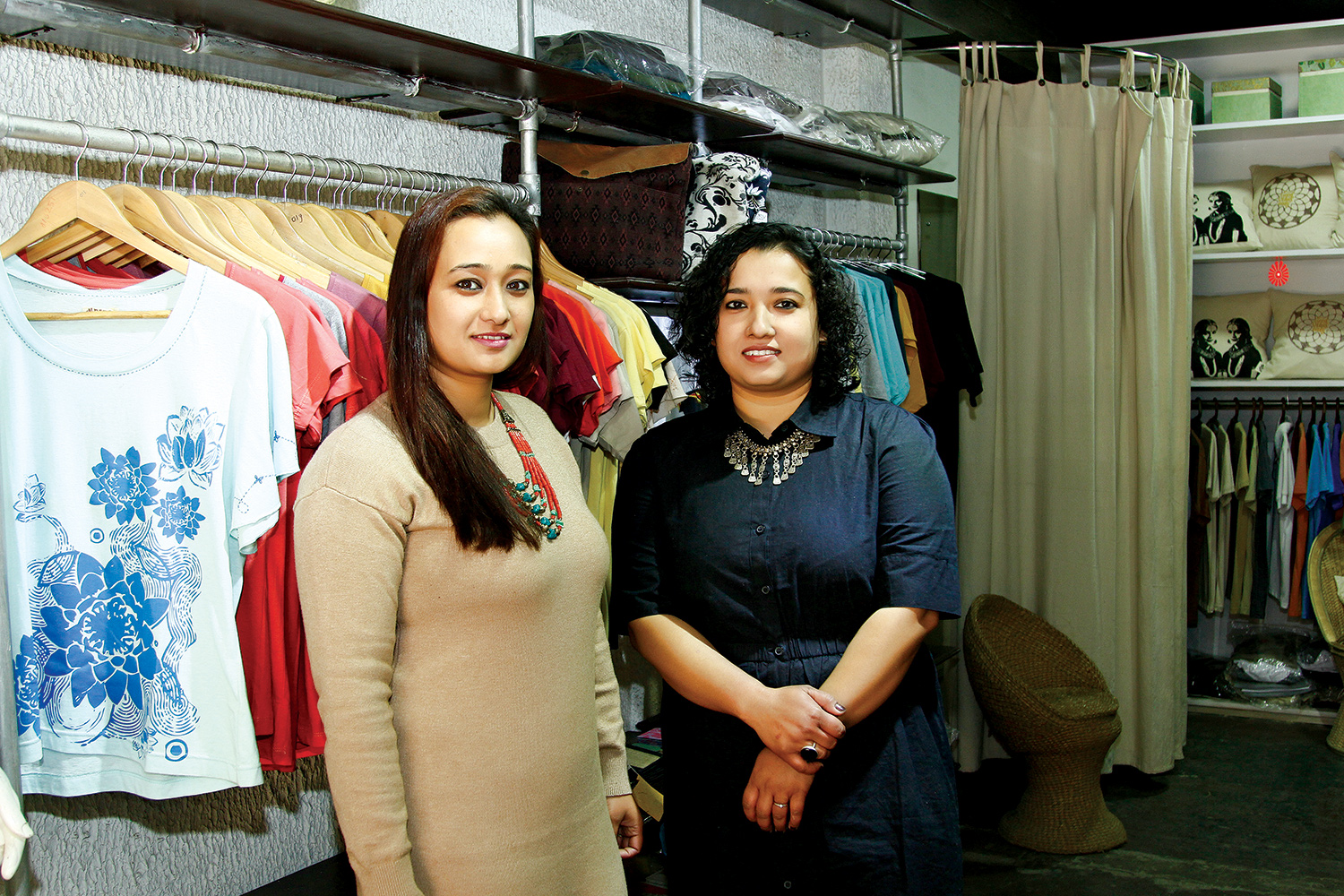
In the past few decades, governments across the world including in Nepal have started to realise the importance of entrepreneurship as a prerequisite for both economic and social development. Policymakers have been stressing on the need to develop entrepreneurs to create employment and keep the markets and economies functioning.
Traditionally men have been at the forefront of business but things have changed immensely in the past two decades and there has been a huge number of women entrepreneurs who are successfully running businesses of varying sizes and genres. Nepal too has seen a sizeable rise in women entrepreneurship.
In the first ever National Economic Census, the Central Bureau of Statistics (CBS) has stated that 29.8% of the enterprises in the country are run by women.
Businesses are not stagnant models; they have a life of their own and evolve along with changing market needs and choices. Today businesses are seeing a growing dependence and interface with technology. The Covid 19 pandemic has in fact fast tracked this and businesses are now more dependent than ever on technology for smooth operations and market outreach.
In this edition of Business 360, we asked a few women entrepreneurs about their views on women entrepreneurship in Nepal, the advantages and the challenges of women-led businesses, and how are they embracing technology in their sectors.
Muskan Nahar
Founder, The Sugar Shack
 The advantages of a woman-led business is that people these days have started getting vocal about women empowerment and they have started supporting women by organising stalls for women-led businesses only. Moreover, a woman-led business also motivates other women to start their own ventures.
However, there are more challenges of owning a woman-led business than there are advantages. For someone like me who started at the age of 19, I have faced quite a few challenges.
People predominantly look for someone older or want to talk to my father before doing business with me. Even after two years, it’s easier for me to get my work done quicker through my father rather than doing it myself because people still don’t take me or my work seriously.
The baking industry has always been considered a male dominated industry since you have to carry heavy utensils, stand for the whole day, and has more muscle work involved. Even the hotels have more men in the kitchen. So being a woman in this industry between so many male chefs, it is difficult to sustain yourself.
The advantages of a woman-led business is that people these days have started getting vocal about women empowerment and they have started supporting women by organising stalls for women-led businesses only. Moreover, a woman-led business also motivates other women to start their own ventures.
However, there are more challenges of owning a woman-led business than there are advantages. For someone like me who started at the age of 19, I have faced quite a few challenges.
People predominantly look for someone older or want to talk to my father before doing business with me. Even after two years, it’s easier for me to get my work done quicker through my father rather than doing it myself because people still don’t take me or my work seriously.
The baking industry has always been considered a male dominated industry since you have to carry heavy utensils, stand for the whole day, and has more muscle work involved. Even the hotels have more men in the kitchen. So being a woman in this industry between so many male chefs, it is difficult to sustain yourself.
 Prior to 1980’s, women-led enterprises were very few in Nepal. By 1990’s the numbers were beginning to show. With the establishment of Women Entrepreneurs Association of Nepal (WEAN), WEAN Cooperative and FWEAN, women entrepreneurship began to flourish not only within the valley but in almost all the districts in Nepal.
Owning a woman-led business allows women to develop self-confidence, financial independence, decision making power, and family health. It empowers not only the woman but also the family, the society and the country as well.
Prior to 1980’s, women-led enterprises were very few in Nepal. By 1990’s the numbers were beginning to show. With the establishment of Women Entrepreneurs Association of Nepal (WEAN), WEAN Cooperative and FWEAN, women entrepreneurship began to flourish not only within the valley but in almost all the districts in Nepal.
Owning a woman-led business allows women to develop self-confidence, financial independence, decision making power, and family health. It empowers not only the woman but also the family, the society and the country as well.
 Entrepreneurship helps a person to explore their ideas to its full extent but it does come with financial risks. Entrepreneurship creates employment opportunities and encourages young people to stay in their country rather than go for foreign employment.
Talking about women entrepreneurship, there are both pros and cons. In many cases, women do have ideas but may not be allowed to get involved in business by the family. In comparison to males, females have to face difficulties even in day-to-day activities as men tend to have more advantages due to our societal construct. This is because men are viewed with authority.
Women entrepreneurs have been found to excel in certain areas of business such as social networking, multi-tasking, patience, and better listening skills.
Entrepreneurship helps a person to explore their ideas to its full extent but it does come with financial risks. Entrepreneurship creates employment opportunities and encourages young people to stay in their country rather than go for foreign employment.
Talking about women entrepreneurship, there are both pros and cons. In many cases, women do have ideas but may not be allowed to get involved in business by the family. In comparison to males, females have to face difficulties even in day-to-day activities as men tend to have more advantages due to our societal construct. This is because men are viewed with authority.
Women entrepreneurs have been found to excel in certain areas of business such as social networking, multi-tasking, patience, and better listening skills.
 Today we might be in a good position than in the yesteryears in terms of women’s participation in the field of entrepreneurship. Government is making an effort at the national level to boost women entrepreneurship but which is still not just enough. The government sponsored development activities have benefitted only a very small section of women, whereas women occupy more than 50% of Nepal’s population.
We need more effective steps to provide entrepreneurial awareness, orientation, skill development programmes for women. Women entrepreneurship must be moulded properly with entrepreneurial traits and skills to meet the changes in trends and the challenges of global markets, while being competent enough to sustain and strive in the entrepreneurial arena.
Competitive factors involve potential entrants, rivalry of firms and substitute products, and cut-throat competition. A majority of small and medium enterprises owned by females lack prior market research and business knowledge due to which women proprietors face problems while operating their businesses. Lack of access to marketing networks, marketing information and appropriate business education deprive women entrepreneurs of a voice and say in mainstreaming their concerns.
Today we might be in a good position than in the yesteryears in terms of women’s participation in the field of entrepreneurship. Government is making an effort at the national level to boost women entrepreneurship but which is still not just enough. The government sponsored development activities have benefitted only a very small section of women, whereas women occupy more than 50% of Nepal’s population.
We need more effective steps to provide entrepreneurial awareness, orientation, skill development programmes for women. Women entrepreneurship must be moulded properly with entrepreneurial traits and skills to meet the changes in trends and the challenges of global markets, while being competent enough to sustain and strive in the entrepreneurial arena.
Competitive factors involve potential entrants, rivalry of firms and substitute products, and cut-throat competition. A majority of small and medium enterprises owned by females lack prior market research and business knowledge due to which women proprietors face problems while operating their businesses. Lack of access to marketing networks, marketing information and appropriate business education deprive women entrepreneurs of a voice and say in mainstreaming their concerns.
 The advantages of a woman-led business is that people these days have started getting vocal about women empowerment and they have started supporting women by organising stalls for women-led businesses only. Moreover, a woman-led business also motivates other women to start their own ventures.
However, there are more challenges of owning a woman-led business than there are advantages. For someone like me who started at the age of 19, I have faced quite a few challenges.
People predominantly look for someone older or want to talk to my father before doing business with me. Even after two years, it’s easier for me to get my work done quicker through my father rather than doing it myself because people still don’t take me or my work seriously.
The baking industry has always been considered a male dominated industry since you have to carry heavy utensils, stand for the whole day, and has more muscle work involved. Even the hotels have more men in the kitchen. So being a woman in this industry between so many male chefs, it is difficult to sustain yourself.
The advantages of a woman-led business is that people these days have started getting vocal about women empowerment and they have started supporting women by organising stalls for women-led businesses only. Moreover, a woman-led business also motivates other women to start their own ventures.
However, there are more challenges of owning a woman-led business than there are advantages. For someone like me who started at the age of 19, I have faced quite a few challenges.
People predominantly look for someone older or want to talk to my father before doing business with me. Even after two years, it’s easier for me to get my work done quicker through my father rather than doing it myself because people still don’t take me or my work seriously.
The baking industry has always been considered a male dominated industry since you have to carry heavy utensils, stand for the whole day, and has more muscle work involved. Even the hotels have more men in the kitchen. So being a woman in this industry between so many male chefs, it is difficult to sustain yourself.
Especially after Covid, companies are relying on technologies which have now become an essential aspect of any business. The Sugar Shack won’t even survive without technology since we don’t have a physical store and all our orders are based over social media sites.And what’s strange is that even after successfully running The Sugar Shack for two years, people still show their concern about me settling and starting a family, as they think that a man will be there to aid me financially. Nowadays, especially after Covid, companies are relying on technologies which have now become an essential aspect of any business. The Sugar Shack won’t even survive without technology since we don’t have a physical store and all our orders are based over social media sites. People trust our pictures and our regular online presence to place their orders. Because of the increase in use of technology it’s easier for us to get new ideas and learn new trends to revamp our business, and to help recognise exactly what the customer is looking for. It helps us connect with other similar businesses across the world and further understand the baking industry. Shyam Badan Shrestha, Maya Rai & Subina Shrestha Co-founders, Nepal Knotcraft Centre
 Prior to 1980’s, women-led enterprises were very few in Nepal. By 1990’s the numbers were beginning to show. With the establishment of Women Entrepreneurs Association of Nepal (WEAN), WEAN Cooperative and FWEAN, women entrepreneurship began to flourish not only within the valley but in almost all the districts in Nepal.
Owning a woman-led business allows women to develop self-confidence, financial independence, decision making power, and family health. It empowers not only the woman but also the family, the society and the country as well.
Prior to 1980’s, women-led enterprises were very few in Nepal. By 1990’s the numbers were beginning to show. With the establishment of Women Entrepreneurs Association of Nepal (WEAN), WEAN Cooperative and FWEAN, women entrepreneurship began to flourish not only within the valley but in almost all the districts in Nepal.
Owning a woman-led business allows women to develop self-confidence, financial independence, decision making power, and family health. It empowers not only the woman but also the family, the society and the country as well.
As for embracing technology, women are now more able at handling various kinds of networking tools and apps. However, it’s been slow for the older generation or the uneducated or where there is no network.Despite multiple challenges and also having to function in a patriarchal society, women entrepreneurs are more resilient, tolerant and able to adapt. Women know how to make lemonade when life throws them a lemon. Anyway, that is entrepreneurship! As for embracing technology, women are now more able at handling various kinds of networking tools and apps. However, it’s been slow for the older generation or the uneducated or where there is no network. Megha Sharma & Neha Sharma Co-founders, Pretty Click
 Entrepreneurship helps a person to explore their ideas to its full extent but it does come with financial risks. Entrepreneurship creates employment opportunities and encourages young people to stay in their country rather than go for foreign employment.
Talking about women entrepreneurship, there are both pros and cons. In many cases, women do have ideas but may not be allowed to get involved in business by the family. In comparison to males, females have to face difficulties even in day-to-day activities as men tend to have more advantages due to our societal construct. This is because men are viewed with authority.
Women entrepreneurs have been found to excel in certain areas of business such as social networking, multi-tasking, patience, and better listening skills.
Entrepreneurship helps a person to explore their ideas to its full extent but it does come with financial risks. Entrepreneurship creates employment opportunities and encourages young people to stay in their country rather than go for foreign employment.
Talking about women entrepreneurship, there are both pros and cons. In many cases, women do have ideas but may not be allowed to get involved in business by the family. In comparison to males, females have to face difficulties even in day-to-day activities as men tend to have more advantages due to our societal construct. This is because men are viewed with authority.
Women entrepreneurs have been found to excel in certain areas of business such as social networking, multi-tasking, patience, and better listening skills.
Despite their role as primary caregivers and householders, women are excelling in business. Some of the common challenges women in business have to face are family consideration, financial barrier, balancing responsibilities, fear of failure, inadequate support system, gender inequality, limited knowledge and un-favourable business environment.Now we can see the presence of more women in different fields and sectors including business. And despite their role as primary caregivers and householders, women are excelling in business. Some of the common challenges women in business have to face are family consideration, financial barrier, balancing responsibilities, fear of failure, inadequate support system, gender inequality, limited knowledge and un-favourable business environment. While talking about embracing technology in business, it helps us as business owners to know the wants and needs of the people and how we can fill those gaps. Technology helps us to know our target audience, how our ideas will impact them, how we can know the things they are looking forward to, and how we can meet those needs. Anuza Rajbhandari Shrestha & Alpaza Joshi Co-founders, Ekadesma
 Today we might be in a good position than in the yesteryears in terms of women’s participation in the field of entrepreneurship. Government is making an effort at the national level to boost women entrepreneurship but which is still not just enough. The government sponsored development activities have benefitted only a very small section of women, whereas women occupy more than 50% of Nepal’s population.
We need more effective steps to provide entrepreneurial awareness, orientation, skill development programmes for women. Women entrepreneurship must be moulded properly with entrepreneurial traits and skills to meet the changes in trends and the challenges of global markets, while being competent enough to sustain and strive in the entrepreneurial arena.
Competitive factors involve potential entrants, rivalry of firms and substitute products, and cut-throat competition. A majority of small and medium enterprises owned by females lack prior market research and business knowledge due to which women proprietors face problems while operating their businesses. Lack of access to marketing networks, marketing information and appropriate business education deprive women entrepreneurs of a voice and say in mainstreaming their concerns.
Today we might be in a good position than in the yesteryears in terms of women’s participation in the field of entrepreneurship. Government is making an effort at the national level to boost women entrepreneurship but which is still not just enough. The government sponsored development activities have benefitted only a very small section of women, whereas women occupy more than 50% of Nepal’s population.
We need more effective steps to provide entrepreneurial awareness, orientation, skill development programmes for women. Women entrepreneurship must be moulded properly with entrepreneurial traits and skills to meet the changes in trends and the challenges of global markets, while being competent enough to sustain and strive in the entrepreneurial arena.
Competitive factors involve potential entrants, rivalry of firms and substitute products, and cut-throat competition. A majority of small and medium enterprises owned by females lack prior market research and business knowledge due to which women proprietors face problems while operating their businesses. Lack of access to marketing networks, marketing information and appropriate business education deprive women entrepreneurs of a voice and say in mainstreaming their concerns.
Lack of access to marketing networks, marketing information and appropriate business education deprive women entrepreneurs of a voice and say in mainstreaming their concerns.The facilitating factors include training, mentoring and exposure to a business environment. Networks and business associations play an important role in supporting, training, information management, and access to mentors, role models, and resources. Women entrepreneurs in Nepal are disadvantaged because formal and informal networks and business development services are largely dominated by men. Women, thus, lack exposure, inhibiting their prospects of growth and expansion. Low participation in trainings, limited access to modern management methods, technology and consulting services are pertinent challenges faced by women entrepreneurs in Nepal. If the policy could have been made more effective and changed accordingly with regards to these terms and stakeholders were able to understand the vital role of women in the modern business field too, then very soon we will be able to witness change in the entrepreneurial ecosystem in Nepal. And yes, technology has played a crucial role in not only uplifting people’s lives but also the overall business scenario. It is the world of information technology and we cannot lag behind in terms of how effectively we use this for our business. The Covid 19 pandemic did cause a lot of trouble for people across the world but it did open our eyes to the many possibilities present if one can make use of available technological tools be it social media or the very serious aspects like artificial intelligence.
Published Date: December 14, 2021, 12:00 am
Post Comment
E-Magazine
RELATED Opinion





